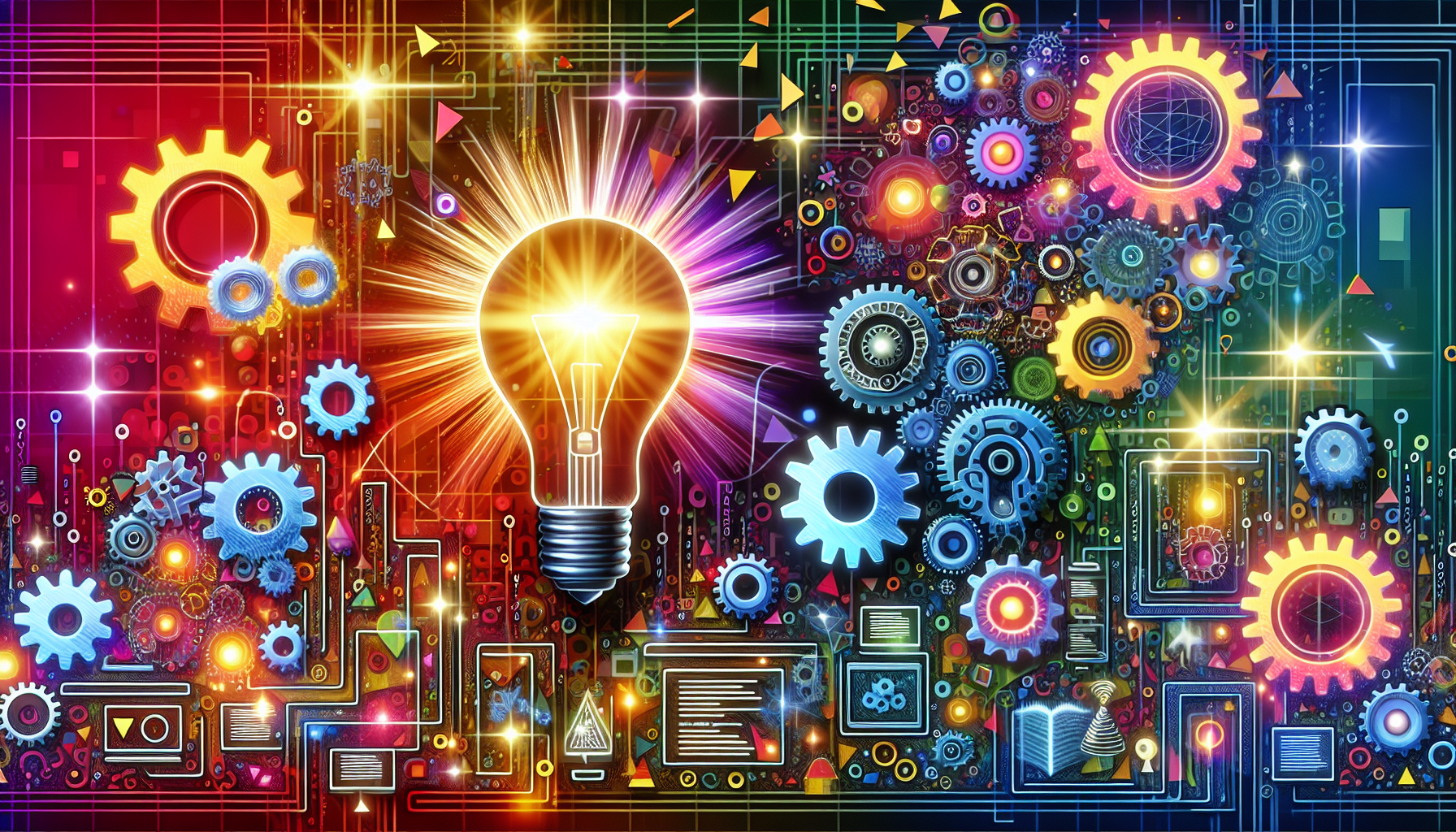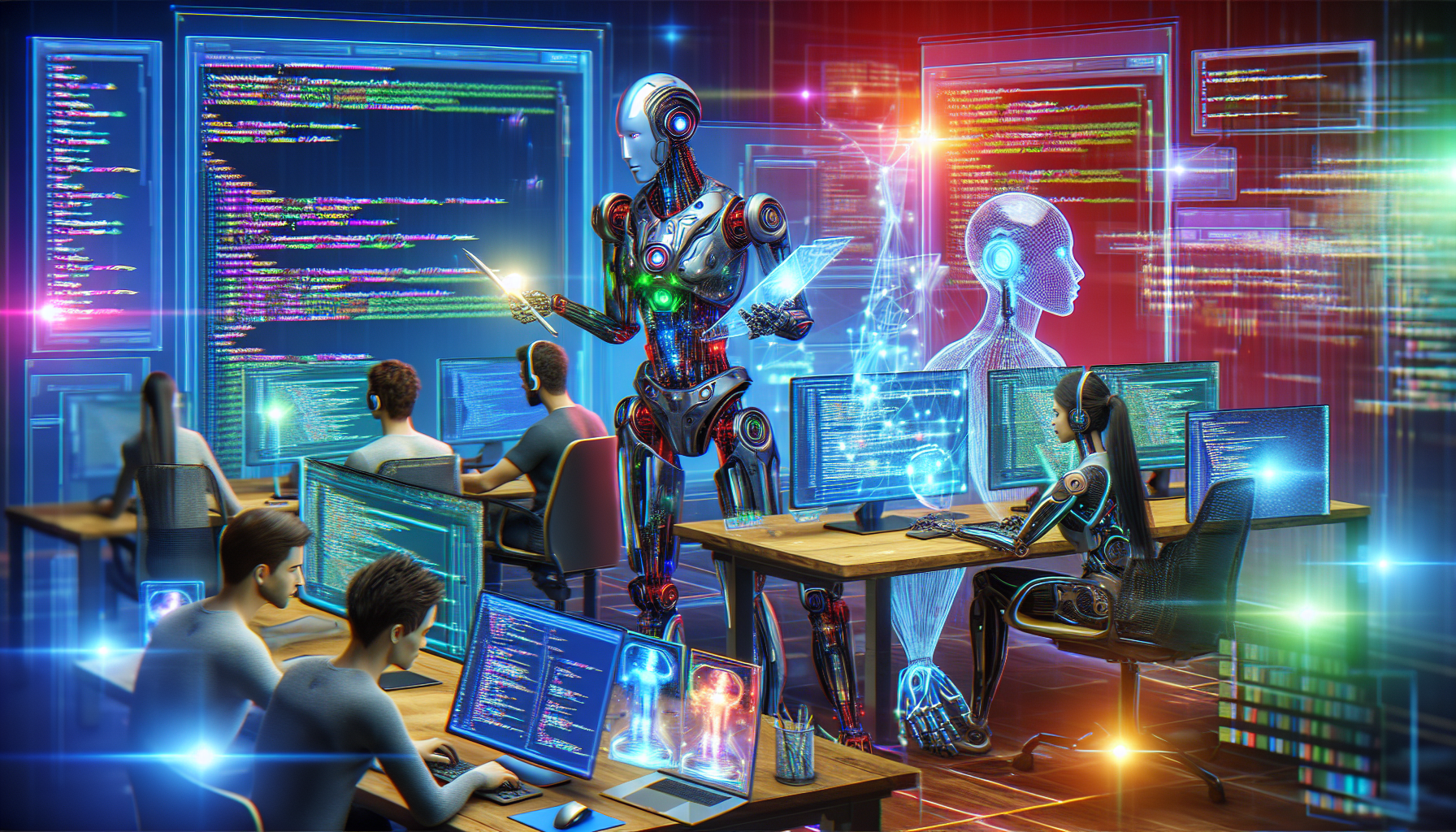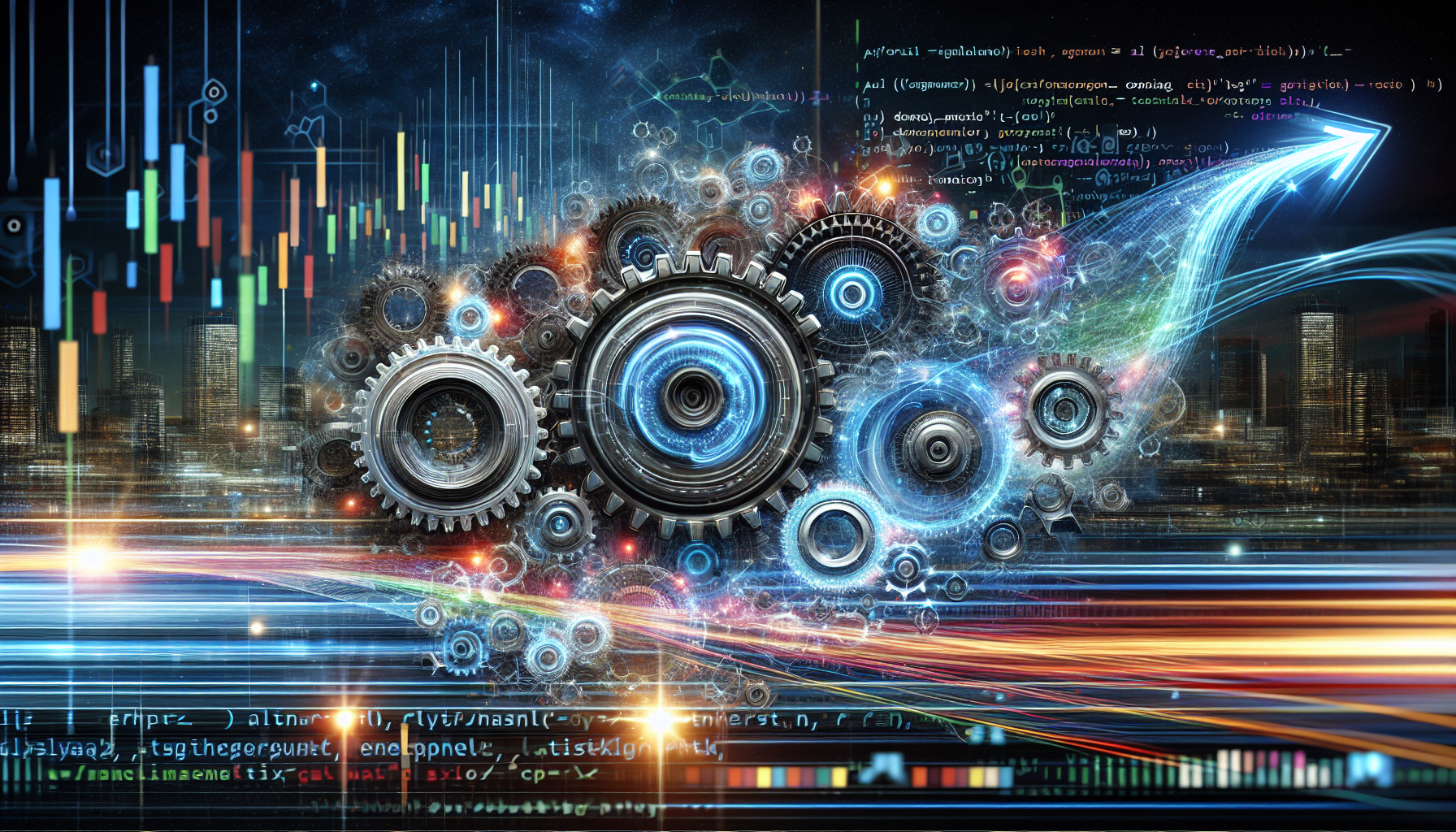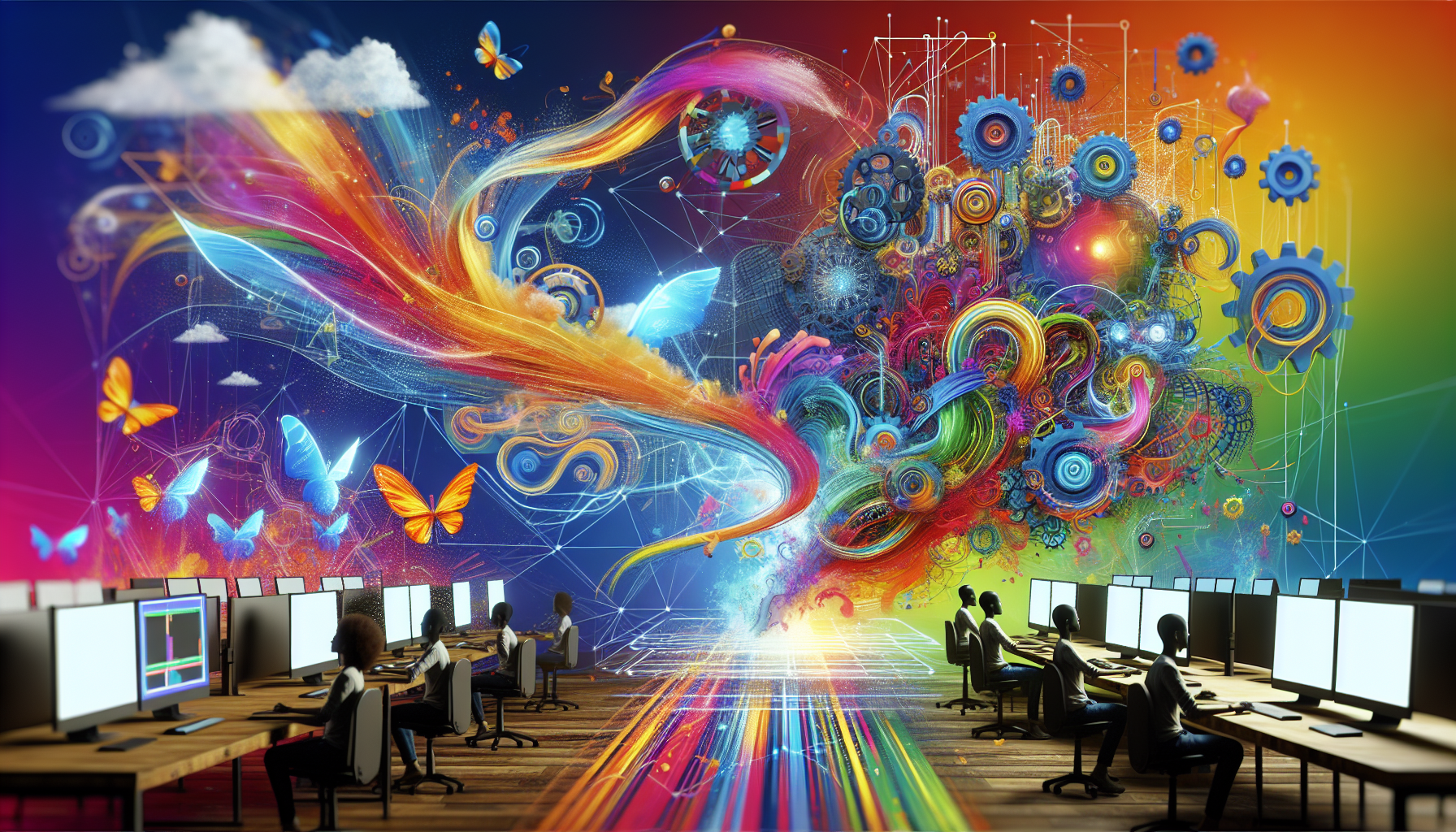AI is revolutionizing software development from automation to innovation by automating coding tasks and enhancing creativity. This guide explores how AI is revolutionizing software development from automation to innovation through tools like ChatGPT and GitHub Copilot, which streamline coding, detect bugs, and improve project management, making development faster and more efficient.
Key Takeaways
- AI tools are automating repetitive tasks in software development, enhancing productivity and allowing developers to focus on complex and creative work.
- Predictive analysis powered by AI is improving software reliability and performance by anticipating potential errors and optimizing resource allocation.
- Human-AI collaboration is vital for innovative software solutions, merging AI automation with human creativity while addressing ethical considerations and challenges in AI-driven development.
Introduction to AI in Software Development
What is AI-driven development?
AI-driven development is a transformative approach in the software development landscape, leveraging the power of artificial intelligence (AI) and machine learning (ML) to automate, streamline, and enhance the development process. This innovative methodology combines traditional software development techniques with cutting-edge AI-powered tools, resulting in a more efficient, productive, and innovative development process. By integrating AI into the development workflow, developers can automate routine tasks, gain valuable insights, and focus on more complex and creative aspects of their projects. This synergy between AI and traditional development practices, including predictive analysis, is revolutionizing the way software is created, maintained, and optimized.
Benefits of AI in software development
The integration of AI in software development offers a multitude of benefits that significantly enhance the development process:
- Improved efficiency: AI-powered tools can automate repetitive and mundane tasks, such as code writing, bug detection, and code reviews. This automation allows developers to focus on more complex and creative tasks, ultimately improving overall efficiency.
- Enhanced productivity: AI-driven development accelerates the development process by providing intelligent assistance and automating routine tasks. This leads to faster project completion and reduced time-to-market for software products.
- Predictive coding: Predictive coding leverages AI to anticipate and suggest code snippets, improving coding efficiency and reducing errors. This not only speeds up the development process but also enhances code quality.
- Increased innovation: AI can help developers identify new opportunities and solutions by analyzing vast amounts of data and providing insights that may not be immediately apparent. This fosters a culture of innovation and creativity, leading to more effective and groundbreaking software solutions.
- Better decision-making: AI-powered analytics provide developers with valuable insights into various aspects of the development process, such as performance metrics, user behavior, and potential issues. These insights enable developers to make more informed decisions, optimizing the development process and improving software quality.
Overview of AI tools in software development
AI tools are becoming indispensable in the software development industry, offering a range of functionalities that automate tasks, improve productivity, and enhance innovation. Some popular AI tools used in software development include:
- Code completion tools: AI-powered code completion tools, such as Visual Studio Code’s IntelliCode, assist developers in writing code more efficiently by providing intelligent code suggestions and completions. These tools analyze the context of the code and offer relevant suggestions, reducing the time and effort required to write code.
- Predictive coding tools: Predictive coding tools, such as Kite, leverage machine learning algorithms to analyze code and predict the next line of code. This predictive capability helps developers write code faster and with fewer errors, streamlining the development process.
- AI-powered testing tools: AI-powered testing tools, such as Testim.io, automate the testing process by generating and executing test cases. These tools can perform large-scale tests that traditional methods cannot keep up with, enhancing overall efficiency and ensuring high-quality software applications.
- Predictive analysis: Predictive analysis tools use AI to forecast potential issues and performance bottlenecks in software applications. By analyzing historical data and identifying patterns, these tools help developers proactively address problems, improving software reliability and performance.
How AI Is Revolutionizing Software Development from Automation to Innovation: A Comprehensive Guide

Imagine a world where software developers can focus on creativity and problem-solving rather than mundane, repetitive tasks. Thanks to AI tools, this is becoming a reality. AI-assisted software development enables the automation of repetitive tasks, allowing developers to concentrate on more value-added activities. Tools like ChatGPT and GitHub Copilot are at the forefront, providing intelligent assistance that can significantly enhance productivity by automating routine tasks and aiding in code writing and management. These AI coding tools can respond to user queries and help programmers navigate unfamiliar domains, making the development process smoother and more efficient.
The landscape of AI tools for software developers is rapidly evolving, with numerous innovative solutions emerging in 2024. These tools are not just enhancing the software development lifecycle but are often portrayed as revolutionary, suggesting that developers might soon be able to generate entire applications with minimal manual coding. AI-driven coding assistants can streamline the initial stages of software creation, offering structured frameworks for new applications, thereby accelerating the development timeline.
As we explore this guide, we’ll delve into various AI technologies and how they are revolutionizing software engineering. From automating repetitive tasks to enhancing software reliability with predictive analysis, we’ll see how AI is enabling developers to achieve more in less time. We’ll also look at how AI is fostering innovation, optimizing resource allocation, and transforming the way we approach software creation.
Introduction
Artificial intelligence is more than just a deep learning framework; it is a catalyst for change in the software development industry. By revolutionizing the creation, maintenance, and testing of code, AI is empowering developers and engineers to work more efficiently and effectively.
In 2024, trending AI code assistant tools are making waves in the market, offering new ways to enhance the development process. This guide will explore the myriad ways AI is transforming software development, from automating repetitive tasks to fostering innovation.
The Role of AI in Automating Repetitive Tasks

One of the most significant benefits of AI in software development is its ability to automate repetitive tasks. This automation not only enhances productivity but also allows developers to focus on more complex and creative aspects of their work. AI tools can automate routine tasks such as code writing, bug detection, and even code reviews, providing intelligent assistance that streamlines the development process. Utilizing AI tools allows developers to boost efficiency and productivity, resulting in quicker and more dependable software creation.
AI-powered coding assistants like ChatGPT and GitHub Copilot are revolutionizing the initial stages of software creation. These tools offer structured frameworks for new applications, making it easier for developers to get started and reducing the time spent on manual coding.
The integration of AI tools in software development is often portrayed as revolutionary, with the potential to rapidly generate entire applications. As we delve deeper into this guide, we’ll explore specific AI tools and their roles in automating various aspects of the software development lifecycle.
AI-Powered Code Completion Tools
Predictive coding, AI-powered ai code completion tool and code generation are transforming the way developers write code.
Tools like:
- GitHub Copilot, which drafts full code lines, crafts functions, and even generates documentation, significantly enhancing developer productivity
- Amazon CodeWhisperer, which also assists in drafting code and documentation
- PyCharm, leveraging AI for code completion and supporting various programming languages such as Java, Python code, and JavaScript, making it a versatile tool for developers
- OpenAI Codex, which offers quick setup and AI-driven code completion, allowing developers to use natural language prompts to generate code
These tools are significantly enhancing developer productivity.
Features such as suggesting relevant code snippets and optimizing coding efficiency help these tools reduce manual effort. The integration of AI in code completion tools signifies a major shift towards automation, making coding more efficient and accessible, including valuable code suggestions.
With tools like Cursor, developers can make code modifications using conversational prompts, further streamlining the coding process. Overall, AI-powered code completion tools are enabling developers to write high-quality code faster and with greater ease.
Automated Bug Detection and Fixing
AI tools are revolutionizing bug detection and fixing, significantly enhancing code quality and reducing debugging time. DeepCode, a cloud-based AI code analysis tool, is known for its accurate bug detection, reducing the debugging time by approximately 70%. These tools minimize the feedback loop in bug detection, allowing for quicker resolution and enabling developers to focus on more complex tasks.
By improving proficiency in pinpointing and fixing bugs, AI-driven tools are making the software development process more efficient and reliable.
Streamlining Code Reviews with AI
AI enhances the code review process by providing precise suggestions and identifying potential issues early on. This helps developers make informed decisions during code reviews, reducing the risk of critical bugs in later development phases.
Integrating AI into code reviews improves code quality and speeds up development cycles, making software more reliable and efficient.
Enhancing Software Reliability with Predictive Analysis

Predictive analysis is another area where AI is making significant strides in software development. Advanced algorithms in AI identify patterns in past data to forecast and proactively prevent potential software errors. This capability enhances the analysis of various data points, improving the capacity to predict software performance variations and ensuring a user-friendly experience. Predictive analysis is essential for enhancing software reliability by anticipating potential issues and optimizing system performance.
AI’s ability to predict and prevent software errors is transforming the software development lifecycle. By recognizing patterns associated with high resource utilization, AI can assist in optimizing software for peak loads, leading to improved performance and reliability.
These insights enable developers to make informed decisions about their applications’ performance, addressing potential issues before they escalate. As we explore further, we’ll see how specific AI tools leverage predictive analysis to enhance software reliability.
Leveraging Machine Learning Models for Error Prediction
Machine learning models predict potential software errors by analyzing historical usage data, enabling proactive measures to prevent system overloads. These models can also analyze code during reviews to highlight potential vulnerabilities before the code is merged, enhancing the security and reliability of software.
Self-learning algorithms in AI testing tools continuously improve test coverage by adapting to software changes, ensuring that new errors are identified quickly. Overall, machine learning models analyze historical data to understand patterns associated with software errors, making the development process more robust and reliable.
Enhancing Exception Handling
AI is also enhancing exception handling by facilitating the use of advanced machine learning models to predict and manage exceptions. These models can provide early warnings about potential equipment failures by analyzing historical data, leading to a more robust software performance.
Analyzing exception data with AI improves future error handling practices, enhancing software resilience and reliability.
Real-Time Performance Monitoring
Real-time performance monitoring is another area where AI tools are essential. AI recognizes patterns associated with high resource utilization, optimizing software for peak loads to improve performance and reliability.
These tools provide insights that help developers make informed decisions about their applications’ performance, ensuring that potential issues are addressed promptly. This optimization leads to a more reliable and efficient software development process.
Accelerating Development Cycles

AI is playing a pivotal role in accelerating development cycles by allowing developers to delegate specific tasks to AI. This delegation enhances efficiency in the development process, allowing developers to focus on more critical aspects of their projects. AI identifies potential issues before testing starts, improving the overall efficiency and accuracy of the development cycle. AI speeds up project timelines and reduces total developmental costs, making software development more economical and efficient.
One of the most significant impacts of AI is the reduction of time spent on debugging and testing phases by approximately 70%. Machine learning models flag potential errors in code by being trained on large codebases and their corresponding test cases, ensuring that developers can address issues quickly and effectively.
As we explore further, we’ll see how AI-driven test generation and continuous integration and deployment (CI/CD) processes contribute to faster development cycles.
AI-Driven Test Generation
AI testing tools are revolutionizing the way test cases are generated, significantly speeding up the testing process. These tools can perform large-scale tests that traditional methods cannot keep up with, enhancing overall efficiency. Automating test generation with AI tools allows developers to concentrate on more complex tasks, resulting in faster and more accurate software development.
Continuous Integration and Deployment (CI/CD) with AI
AI is optimizing continuous integration and deployment (CI/CD) pipelines, leading to more efficient software delivery. Continuous improvements in software delivery cycles due to AI utilization help streamline processes, reducing time and human effort associated with test generation. AI can monitor deployment processes in real-time, ensuring quicker resolution of issues and better reliability. Predictive analytics powered by AI can anticipate potential deployment failures before they occur, enhancing the overall reliability of the development process.
AI also supports continuous feedback loops in CI/CD, enhancing developer responses to deployment results and ensuring that any issues are addressed promptly. Using AI in CI/CD processes speeds up and makes software delivery more reliable, ultimately reducing the time-to-market for new products.
Reducing Time-to-Market
Incorporating AI into development processes can significantly shorten the time needed to bring products to market. AI reduces the timeframe of software development compared to traditional methods, ensuring that products are delivered faster and more efficiently.
AI analyzes developer work patterns to optimize task assignments based on past performance and project needs, boosting team efficiency and productivity.
Optimizing Resource Allocation and Team Productivity
AI is also enhancing resource allocation and team productivity by unifying data from various sources and providing predictive analytics. Automation in resource allocation reduces human error and enhances productivity, allowing developers to focus on more complex tasks. AI tools streamline project management by providing immediate feedback on software performance and filtering unnecessary notifications, ensuring that teams can work more efficiently.
AI tools help developers optimize resource allocation and enhance team productivity, leading to more successful software development projects. As we explore further, we’ll see how AI-based project management tools and personalized developer support contribute to these improvements.
AI-Based Project Management Tools
AI-based project management tools are transforming the way projects are managed through predictive analytics. These tools automate scheduling by analyzing project needs and resource availability, enhancing decision-making and resource management.
AI-integrated project management tools provide developers with enhanced control over their activities, ensuring swift problem detection and mitigation. By recommending suitable task assignments aligned with each developer’s expertise, these tools enhance overall project efficiency and success.
Personalized Developer Support
AI provides personalized support to developers by identifying skill gaps and suggesting tailored resources. These tools enable real-time data access for pattern recognition and trend analysis, helping developers improve their skills and work more efficiently.
AI offers relevant resources and tutorials, fostering continuous improvement in developers’ work and ensuring high-quality code and enhanced software engineering.
Analyzing Developer Work Patterns
AI analyzes developer work patterns to optimize resource allocation and improve team productivity. By assessing historical work data, AI-based project management tools assign tasks effectively based on individual developer strengths.
Personalized support systems offer tailored resources and recommendations, aiding developers in working more efficiently and enhancing the overall development environment. The integration of AI in analyzing work patterns results in optimized task assignments and significantly boosts team efficiency.
Overview of Popular AI Coding Tools
Visual Studio Code and AI integration
Visual Studio Code (VS Code) is a widely-used code editor that has embraced AI-powered tools to enhance the development experience. Some of the notable AI-powered features integrated into VS Code include:
- IntelliCode: IntelliCode is an AI-powered code completion tool that provides intelligent code suggestions based on the context of the code. By analyzing patterns in the codebase, IntelliCode helps developers write code more efficiently and effectively, reducing the time and effort required to complete tasks.
- Code suggestions: VS Code’s AI-powered code suggestions offer developers recommendations for code improvements, helping them write cleaner and more efficient code. These suggestions are based on best practices and common coding patterns, ensuring high-quality code.
- Predictive coding: The predictive coding feature in VS Code analyzes the code and provides predictions for the next line of code. This capability helps developers write code faster and with fewer errors, streamlining the development process and enhancing productivity.
GitHub Copilot and its features
GitHub Copilot is a revolutionary AI-powered coding assistant that has transformed the way developers write code. Developed by GitHub and OpenAI, Copilot is designed to assist developers in writing code more efficiently and effectively. With its advanced features, Copilot can generate code snippets, complete functions, and even provide suggestions for improving code quality.
One of the key features of GitHub Copilot is its ability to understand the context of the code and provide relevant suggestions. It uses machine learning algorithms to analyze the code and identify patterns, allowing it to make accurate predictions about the code. Additionally, Copilot can learn from the developer’s coding style and adapt its suggestions accordingly.
GitHub Copilot supports a wide range of programming languages, including Python, Java, JavaScript, and C++. It is also integrated with popular IDEs such as Visual Studio Code, making it easy to use and accessible to developers. By leveraging the power of AI, GitHub Copilot helps developers generate code more quickly and efficiently, reducing the time and effort required to write high-quality code.
Fostering Innovation in Software Development

AI is increasingly adopted in the software development industry to enhance operational efficiency and drive innovation. By enabling teams to craft superior software with enhanced user experiences, AI fosters creativity and innovation in software development. AI allows for crafting advanced software solutions adaptable to various industry verticals, ensuring that software initiatives align with client aspirations. The merger of humans and AI technologies enhances creativity and productivity in software development, combining AI automation with human creativity to create innovative software solutions.
AI-powered analytics provide instantaneous information on pinpointing promising leads and clientele, assisting in project roadmap development and ensuring cohesive and engaging designs. AI tools give software companies a competitive advantage by providing innovative, efficient, and reliable tools, fostering a culture of continuous improvement and creativity.
AI-Enhanced Creativity Tools
AI creativity tools support brainstorming sessions, leading to innovative and diverse ideas in software design. These tools offer advanced features and capabilities, enabling developers to explore new approaches and solutions, enhancing the overall software creation process.
AI-powered tools provide developers with the resources they need to generate high-quality code and innovative software solutions, driving continuous improvement and creativity in software development.
Natural Language Processing in Coding
Natural Language Processing (NLP) technologies are making programming more accessible by allowing developers to write and execute code using everyday language. NLP processes natural language commands into executable code, enabling quicker iterations in development, streamlining the coding process, and reducing the time needed to write code. This enhancement significantly speeds up the software development lifecycle, making it easier for developers to focus on more complex tasks.
Overall, NLP enhances programming accessibility and efficiency, allowing developers to convert simple language instructions into functional code. Using NLP, developers can optimize code quality and reduce syntax errors, ensuring high-quality code and more efficient software engineering.
NLP technologies are transforming the coding process, making it more intuitive and accessible for developers working with various programming languages.
Integrating AI with Emerging Technologies
The integration of AI with emerging technologies is leading to the development of advanced applications. AI integration with IoT enables the creation of interconnected applications that can process real-time data effectively, enhancing overall system performance.
Combining AI with blockchain technology can improve security and transparency in software applications, while the fusion of AI with AR/VR technology can create immersive user experiences. AI tools and technologies enable developers to create innovative and advanced applications that meet the evolving needs of users and industries.
Human-AI Collaboration in Software Development
Human-AI collaboration is transforming team dynamics and product delivery mechanisms in software development. Integrating AI allows developers to amplify their skills and ensure top-tier quality in their projects. AI shoulders routine coding burdens, liberating developers’ creativity for higher-level tasks and enabling them to focus on more complex and innovative aspects of their work. This collaboration requires developers to adapt and learn new skills, ensuring they stay competitive in the evolving software development landscape.
AI-driven approaches are essential for software engineers to remain competitive, as AI enhances efficiency and productivity in software development. Combining AI automation with human intuition and creativity enables developers to create innovative and high-quality software solutions.
As we delve deeper, we’ll explore specific aspects of human-AI collaboration, such as Human-in-the-Loop systems and balancing AI automation with human intuition.
Human-in-the-Loop (HITL) Systems
Human-in-the-Loop (HITL)systems integrate human judgment into AI operations, enhancing decision-making in AI-powered development. Domain experts play a crucial role in HITL systems by providing specialized insights that improve AI system performance in their areas of expertise.
Integrating human expertise into the AI lifecycle, HITL systems significantly enhance model training and operational effectiveness, resulting in better performance and more reliable software development.
Balancing AI Automation with Human Intuition
A balanced approach that combines AI with human intuition is essential in software development. This approach leverages the strengths of AI while still valuing human input and creativity, ensuring that the software development process is both efficient and innovative.
Human intuition is crucial in refining and optimizing code produced by AI systems, ensuring high-quality and reliable software solutions.
Ethical Considerations in AI-Driven Development
Ethical considerations in AI-driven software development are crucial in ensuring fairness and accountability in automated processes. Managing AI model bias is essential to prevent discrimination and support equitable outcomes in software applications.
Security and privacy in AI development are vital for safeguarding sensitive data and maintaining user trust, making ethical practices a cornerstone of AI-driven development.
AI-Enhanced Data Analysis for Informed Software Development
AI-enhanced data analysis is a crucial aspect of informed software development. With the help of AI tools, developers can analyze vast amounts of data and gain valuable insights that can inform their development decisions. AI-powered data analysis can help identify trends, patterns, and correlations in the data, allowing developers to make data-driven decisions.
One of the key benefits of AI-enhanced data analysis is its ability to automate the process of data analysis. AI tools can quickly process large datasets and provide insights that would take humans hours or even days to analyze. Additionally, AI-powered data analysis can help identify biases and errors in the data, ensuring that the insights gained are accurate and reliable.
AI-enhanced data analysis can be applied to various aspects of software development, including requirements gathering, design, testing, and deployment. By leveraging AI-powered data analysis, developers can create software that is more efficient, effective, and user-friendly. This integration of AI tools in the software development process ensures that decisions are based on comprehensive and accurate data, leading to better outcomes and more innovative solutions.
Implementing AI-Driven Development
Implementing AI-driven development requires a strategic approach that involves several key considerations. One of the primary considerations is the selection of the right AI tools and technologies. Developers must choose AI tools that are compatible with their existing development environment and can integrate seamlessly with their workflow.
Another key consideration is the development of a clear AI strategy that aligns with the organization’s goals and objectives. This involves identifying the areas where AI can add the most value and developing a roadmap for implementation. A well-defined strategy ensures that AI tools are used effectively and that their benefits are maximized.
Additionally, implementing AI-driven development requires a cultural shift within the organization. Developers must be willing to adopt new technologies and workflows, and organizations must be willing to invest in training and education to ensure that developers have the necessary skills to work with AI tools. This cultural shift is essential for the successful integration of AI into the development process, fostering an environment of continuous learning and innovation.
Key Considerations for Implementing AI-Driven Development
When implementing AI-driven development, there are several key considerations that developers must keep in mind. One of the primary considerations is the need for high-quality data. AI tools require large amounts of high-quality data to learn and make accurate predictions. Ensuring that the data used is clean, relevant, and comprehensive is crucial for the success of AI models.
Another key consideration is the need for transparency and explainability. AI models must be transparent and explainable, allowing developers to understand how the models are making predictions and decisions. This transparency is essential for building trust in AI systems and ensuring that they are used responsibly.
Additionally, implementing AI-driven development requires a focus on security and ethics. AI tools must be designed with security and ethics in mind, ensuring that they do not compromise user data or perpetuate biases. Developers must be vigilant in addressing potential biases in AI models and ensuring that ethical considerations are integrated into the development process.
The Future of Software Development with AI
The future of software development with AI is exciting and rapidly evolving. As AI technologies continue to advance, we can expect to see even more sophisticated AI-powered tools and platforms that can assist developers in creating software.
One of the key trends in the future of software development with AI is the rise of low-code and no-code development platforms. These platforms use AI to automate the development process, allowing developers to create software without writing code. This democratization of software development enables more people to participate in the creation of software, leading to a more diverse and innovative development landscape.
Another key trend is the increasing use of AI-powered testing and debugging tools. These tools use machine learning algorithms to identify bugs and errors in the code, allowing developers to test and debug their software more efficiently. By automating these processes, AI tools can significantly reduce the time and effort required for testing and debugging, leading to faster development cycles and higher-quality software.
Redefining the Developer’s Role
The rise of AI-driven development is redefining the developer’s role in several ways. One of the primary ways is the shift from manual coding to AI-assisted coding. With AI-powered tools, developers can focus on higher-level tasks such as design, architecture, and testing, rather than manual coding. This shift allows developers to leverage their creativity and problem-solving skills, leading to more innovative and effective software solutions.
Another way that AI is redefining the developer’s role is the increasing focus on data science and analytics. Developers must now have a strong understanding of data science and analytics to work effectively with AI tools and platforms. This requires a new set of skills and knowledge, emphasizing the importance of continuous learning and professional development.
Additionally, the rise of AI-driven development is requiring developers to have a more collaborative mindset. Developers must work closely with AI tools and platforms to create software, requiring a more collaborative and iterative approach to development. This collaboration between humans and AI enhances the development process, leading to more efficient and innovative software solutions.
Challenges and Limitations of AI in Software Development
Despite its many benefits, AI in software development comes with its own set of challenges and limitations. Many developers report encountering issues with AI tools, such as non-functional code and naming inconsistencies. The effectiveness of AI tools often depends on the user’s familiarity with them and their ability to discern relevant suggestions. Managing evolving software requirements is another significant challenge in AI-driven software development, requiring continuous validation to ensure AI tools function correctly in dynamic environments.
Organizations also face challenges in adopting AI, including continuous improvement efforts and training requirements. Bias in AI models can stem from unrepresentative training data, leading to skewed outcomes and necessitating human involvement to increase accuracy and mitigate biases.
Ensuring ethical practices in AI development involves addressing biases and safeguarding data privacy, focusing on fairness, transparency, and accountability in AI systems.
Data Quality and Availability
High-quality data is crucial for training AI models effectively, as it directly affects model performance. The performance of AI systems relies on the quality of the training data, where inaccuracies can lead to poor outcomes. Organizations often face challenges in data availability, which can hinder the development and effectiveness of AI models.
Strategies such as enhancing data collection methods and improving collaboration between data providers can increase data availability for AI projects, ensuring that AI tools function correctly and deliver accurate results.
Managing AI Model Bias
AI model bias is caused by flawed assumptions in algorithms and biased training data, leading to unfair outcomes. Historical data used to train AI systems often reflects societal biases, causing the models to reproduce these inequalities. The design of AI algorithms can introduce bias based on the features selected and how they are weighted.
Human oversight is crucial in identifying and correcting biases that AI systems may overlook. Diverse data collection helps ensure that AI systems make equitable decisions, and regular bias testing can reveal discrepancies in AI outcomes across different demographic groups.
Transparent AI model practices improve trust by clearly documenting how models are trained and how decisions are made.
Ensuring Security and Privacy
AI systems in software development can pose significant security risks due to vulnerabilities in model training and data handling. The reliance on high-quality data is crucial since poor data quality can lead to mispredictions and security oversights. Bias in AI models can lead to unfair and potentially insecure outcomes, making bias management essential for security and privacy.
To ensure security and privacy in AI applications, developers must integrate risk management practices into the development lifecycle, safeguarding sensitive data and maintaining user trust.
Summary
AI is revolutionizing software development by automating repetitive tasks, enhancing reliability with predictive analysis, accelerating development cycles, and fostering innovation. By optimizing resource allocation and boosting team productivity, AI tools are transforming the way developers work. Human-AI collaboration is essential for maximizing the benefits of AI, balancing automation with human intuition, and ensuring ethical practices in AI-driven development. As we continue to leverage AI tools, the future of software development looks promising, with more efficient, reliable, and innovative solutions on the horizon.
Frequently Asked Questions
How do AI-powered code completion tools benefit developers?
AI-powered code completion tools significantly boost developer productivity by offering intelligent code suggestions and automating tasks like drafting code lines and generating documentation, ultimately making coding more efficient.
What are the benefits of AI-driven test generation?
AI-driven test generation enhances overall efficiency by automating the creation of test cases and enabling large-scale testing that outpaces traditional methods. This leads to significantly faster testing processes and improved software quality.
How does AI improve exception handling in software development?
AI improves exception handling in software development by predicting potential failures through advanced machine learning models, allowing for early warnings and more effective management of exceptions. This leads to enhanced error handling practices, ultimately improving software reliability.
What are the challenges of AI in software development?
AI in software development faces challenges such as managing non-functional code, naming inconsistencies, evolving requirements, continuous validation, significant training efforts, and overcoming biases in AI models to ensure fairness and accuracy. Addressing these issues is essential for effective implementation.
How can AI tools optimize resource allocation and team productivity?
AI tools can significantly optimize resource allocation and team productivity by consolidating data for predictive analytics, automating scheduling tasks, and delivering real-time performance feedback. This leads to improved project efficiency and enhanced team collaboration.
About InTech Ideas
If you’re looking to elevate your tech strategy and drive business growth, InTech Ideas is here to help. We offer a comprehensive suite of services, including Software Development Teams, Product Development Fast Track, and Product Leadership & Advisory. Whether you need to scale your development team, fast-track your product, or bring in expert leadership, we provide tailored, people-first solutions that align with your company’s goals. Learn more about how we can support your journey by exploring our services or contacting us today to discuss your specific needs.

